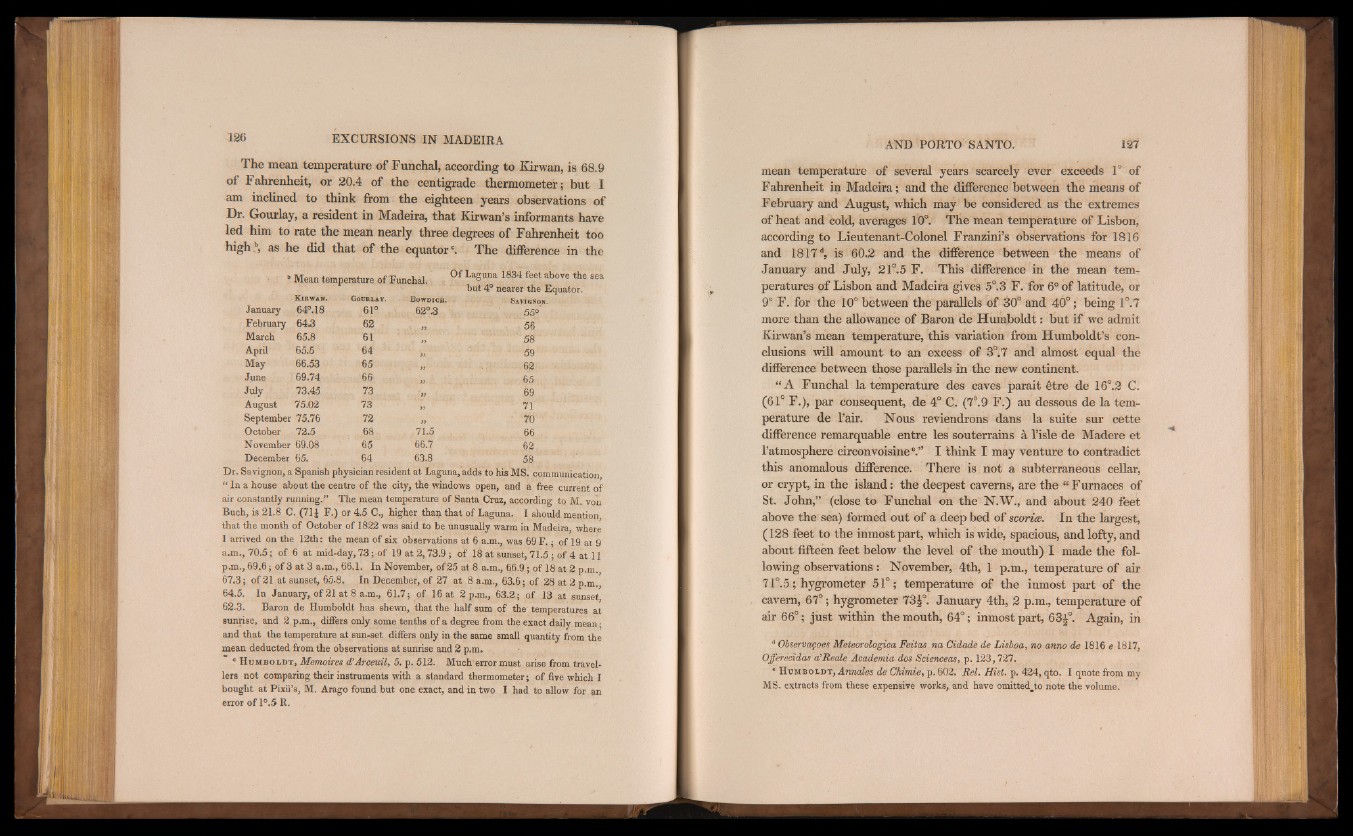
The mean temperature of Funchal, according to Kirwan, is 68.9
of Fahrenheit, or 20.4 of the centigrade thermometer; but I
am inclined to think from the eighteen years observations of
Dr. Gourlay, a resident in Madeira, that Kirwan’s informants have
led him to rate the mean nearly three degrees of Fahrenheit too
high.b, as he did that of the equator'. The difference in the
‘ Mean temperature of Funchal. ° f Lagwna but 4° n1ea8r3e4r fteheet aEbqouvaet otrh.e sea K ir w a n . Go u r l a y . B o w d ic h . Sa v ig n o n January 64°. 18 61° 62°B 55°' February 64.3 62 56 March 65.8 61 . yy ' 58 April 65.5 64 yy 59 May 66.53 65 yy 62 June 69.74 66 yy 65 July 73.45 73 yy 69
August 75.02 73 yy 71
September 75.76 72 yy 70
October 72.5 68 71.5 66 .
November 69.08 65 66.7 62
December 65. 64 63.8 58
Dr. Savignon, a Spanish physician resident at Laguna, adds to his MS. communication
“ In a house about the centre of the city, the windows open, and a free current of
air constantly running.” The mean temperature of Santa Cruz, according to M. von
Buch, is 21.8 C. (71J F.) or 45 C., higher than that of Laguna. I should mention,
that the month of October of 1822 was said to be unusually warm in Madeira, where
I arrived on the 12th: the mean of six observations at Ç a.m., was 69 F. ; of 19 at 9
a.m., 70.5 ; of 6 at mid-day, 73 ; of 19 at 2,73.9 ; of 18 at sunset, 71.5 ; of 4 at 11
p.m., 69.6 ; of 3 at 3 a.m., 66.1. In November, of 25 at 8 a.m., 66.9 ; of 18 at 2 p.m.
67.3; of 21 at sunset, 65.8. In December, of 27 at 8 a.m., 63.6; of 28 at 2 p.m.,
64.5. In January, of 21 at 8 a.m., 61.7; of 16 at 2 p.m., 63.2; of 13 at sunset
62.3. Baron de Humboldt has shewn, that the half sum of the temperatures at
sunrise, and 2 p.m., differs only some tenths of a degree from the exact daily mean-
and that the temperature at sun-set differs only in the same small quantity from the
mean deducted from the observations at sunrise and 2 p.m.
J H u m b o l d t , Mémoires d’Arceuil, 5. p. 512. Much'error must arise from travellers
not comparing their instruments with a standard thermometer; of five which I
bought at Pixii’s, M. Arago found but one exact, and in two I had to allow for an
error of 1°.5 R.
mean temperature of several years scarcely ever exceeds 1° of
Fahrenheit in Madeira; and the difference between the means of
February and August, which may be considered as the extremes
of heat and cold, averages 10°. The mean temperature of Lisbon,
according to Lieutenant-Colonel Franzini’s observations for 1816
and 1817d, is 60.2 and the difference between the means of
January and July, 21°.5 F. This difference in the mean temperatures
of Lisbon and Madeira gives 5°.3 F. for 6° of latitude, or
9° F. for the 10° between the parallels of 30° and 40° ; being 1°.7
more than the allowance of Baron de Humboldt : but if we admit
Kirwan’s mean temperature, this variation from Humboldt’s conclusions
will amount to an excess of 3°.7 and almost equal the
difference between those parallels in the new continent.
“A Funchal la temperature des caves parait être de 16°.2 C.
(61° F.), par consequent, de 4° C. (7°.9 F.) au dessous de la temperature
de l’air. Nous reviendrons dans la suite sur cette
difference remarquable entre les souterrains à l’isle de Madere et
l’atmosphere circonvoisine'.” I think I may venture to contradict
this anomalous difference. There is not a subterraneous cellar,
or crypt, in the island : the deepest caverns, are the * F urnaces of
St. John,” (close to Funchal on the N.W., and about 240 feet
above the sea) formed out of a deep bed of scoria. In the largest,
(128 feet to the inmost part, which is wide, spacious, and lofty, and
about fifteen feet below the level of the mouth) I made the following
observations : Npvember, 4th, 1 p.m., temperature of air
71°.5 ; hygrometer 51°; temperature of the inmost part of the
cavern, 67° ; hygrometer 73£°. January 4th, 2 p.m., temperature of
air 66° ; just within the mouth, 64° ; inmost part, 63j°. Again, in
d Observaçoes Meteorologica Feitas na Cidade de Lisboa, no anno de 1816 e 1817,
Offerecidas a'ReaXe Academia.dos Scienceas, p. 123,727.
• H u m b o l d t , Annales de Chimie, p. 602. Rel. Hist. p. 424, qto. I quote from, my
MS. extracts from these expensive works,, and have omittedJ;o note the volume.